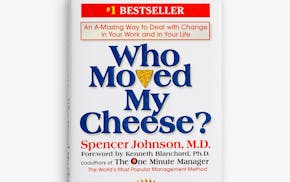A Midwest university professor complained: "We are now focusing more on how to use the tools of communication than we are on how to effectively communicate. ... As a result, we are turning out computer and Internet gurus who can't write and think creatively."
Is writing and thinking creatively important? Is substance important? Is critical thinking important?
You bet. Making your points to your boss or anyone else requires more than information. It demands the critical thinking that convinces them of your point of view.
Technology has set us back in the field of thinking, trusting gadgets to do some of our thinking rather than using them to enhance our lives.
Critical thinking has never been more important -- or more challenging. With so much information bombarding us 24/7, sifting through the content to find factual, legitimate and useful material is no small task. Do you believe everything you read or hear? Do you check sources?
Thomas Edison, the genius of invention, had a way of thinking that was both critical and creative. Fortunately, it's a habit you can cultivate. Take some lessons from Edison's thinking processes as outlined by Michael Michalko in "Three Lessons in Creativity From Thomas Edison":
Question all assumptions. When hiring an employee, it is rumored Edison would invite the person to join him for soup. The person wouldn't get the job if he salted the soup before tasting it.
Generate as many ideas as possible. You're more likely to find an idea that works if you test several. Edison is reported to have conducted more than 50,000 experiments before getting the alkaline storage cell battery just right.
Analyze your failures. If an experiment fails, set aside time to think about what you learned. You can re-examine your efforts if you keep notes on progress and failures.
Adapt other ideas. Look for ways to take policies, systems or ideas already working somewhere else and turn them into something you can use in your own department.
Record all your ideas. Spend time reviewing the ideas and looking for connections. You might find new ways of thinking about something.
These techniques may not make you into Thomas Edison, but they'll help you learn to filter out the garbage that clouds your thinking and decision-making. There is plenty of junk floating around out there. I would also recommend these two rules:
Avoid jumping to conclusions and snap judgments. You might be tempted to dismiss a new acquaintance because he wears tennis shoes with his suit. You later discover that he's a brilliant thinker with bad feet. Be sure to collect additional information before drawing conclusions.
Don't take a "yes or no" approach to data and decisions. Even the most straightforward questions may contain shades of gray. Make a habit of exploring the edges of a problem and looking beyond the obvious alternatives. Is there a middle path, or one that includes both options?
Changing your thinking patterns takes practice, but as it becomes habit, you'll notice that you will not second-guess yourself as often and will spend less time worrying about "what if?"
Critical thinking can also help you with creative solutions to problems.
A man had traveled about six miles in a taxi when he realized he had left his wallet at home. Knowing he had a problem, he knew he had to take some kind of action. About a block short of his destination he leaned forward and told the driver: "Stop at this hardware store. I need to buy a flashlight so I can look for the hundred dollar bill that I dropped back here."
When he left the hardware store, the taxi was gone.
Mackay's Moral: Critical thinking is critical to success.
Harvey Mackay is a Minneapolis businessman. Contact him at 612-378-6202 or e-mail harvey@mackay.com.
Mackay: Approach AI with a mindset of collaboration rather than fear

Mackay: The key to winning in sports, business and life is practice

Mackay: Humor can make even dire situations bearable

Mackay: Want a raise? How and when you ask for it matter


